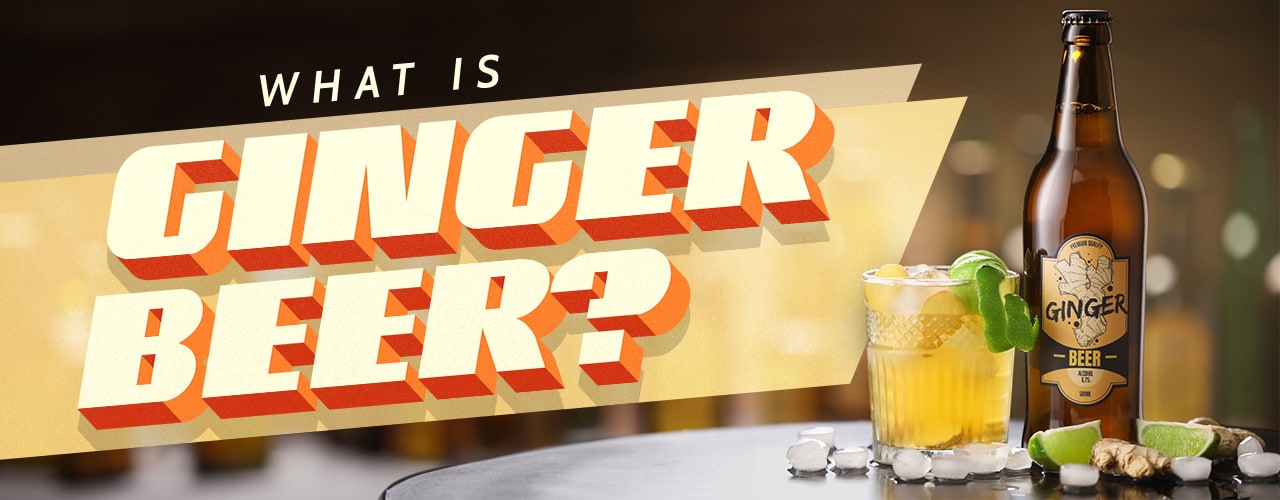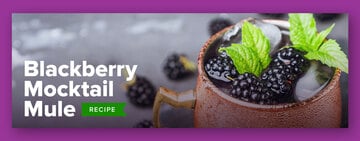When it comes to refreshing and invigorating beverages, ginger beer provides a unique experience. This effervescent and zingy drink has been enjoyed for centuries, offering a unique combination of spicy, sweet, and tangy flavors. Popularly used as a mixer for cocktails, its aromatic and spicy qualities pair well with a wide range of spirits. Read on to learn what ginger beer is and how it differs from its close relative, ginger ale.
Shop All Ginger BeerWhat Is Ginger Beer?
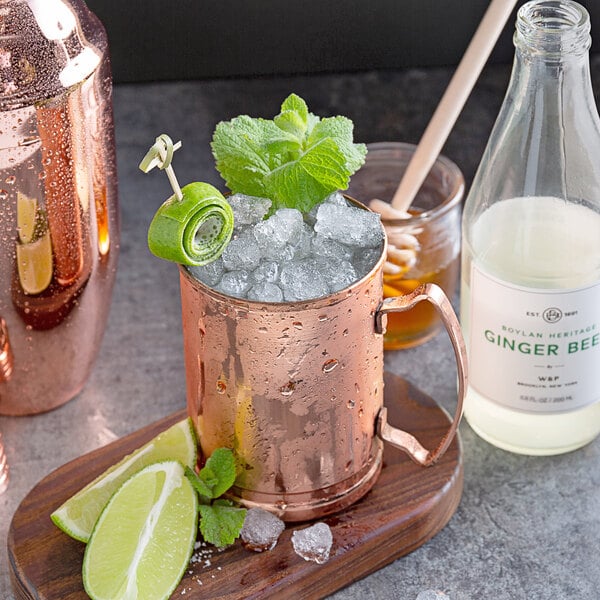
Despite its name, ginger beer is not actually a type of beer, but rather a non-alcoholic carbonated drink that is made from ginger root. It is often used as a mixer in cocktails or enjoyed on its own as a refreshing and zesty beverage. Its unique flavor is derived from the spicy and aromatic oils found in ginger root, which give it a distinctive kick that sets it apart from other carbonated drinks.
Ginger beer is widely used as a standalone refreshing drink, served chilled or over ice. Its robust ginger taste gives it a satisfying kick, making it a popular choice for those who enjoy a more intense flavor experience. Additionally, ginger beer has gained prominence as a versatile mixer in a variety of cocktails, mocktails, and lemonades. Its spicy and complex profile enhances the flavors of various spirits, including rum, vodka, whiskey, and tequila, making it an essential ingredient in classics like the Moscow Mule and the Dark 'n' Stormy.
Is Ginger Beer Non-Alcoholic?
The answer is that it depends on the type of ginger beer you are drinking. Traditionally, ginger beer was fermented and contained a small amount of alcohol. However, most commercial ginger beers available today are non-alcoholic. These versions undergo a brewing process that ensures the alcohol content remains below 0.5% by volume, classifying them as non-alcoholic beverages perfect for serving at zero-proof bars.
What Does Ginger Beer Taste Like?
Ginger beer packs a punch with its bold flavor profile. Its key ingredients are carbonated water, cane sugar, and ginger root, which gives it a strong and spicy ginger flavor with a balanced sweetness. Many ginger beers also contain lemon or lime extract for a note of tangy citrus to round out the strong ginger flavor.
Is Ginger Beer Good for You?
Ginger beer, in moderation, can offer certain health benefits. Ginger itself has been traditionally used to aid digestion and reduce nausea. Additionally, ginger contains compounds with potential anti-inflammatory and antioxidant properties. However, it's important to note that commercially available ginger beers may have added sugars and varying levels of ginger content. Excessive consumption of sugary ginger beer can contribute to health issues like weight gain and increased risk of diabetes. Therefore, while ginger beer can be enjoyed as an occasional treat or in moderation, it's important to be mindful of its sugar content and choose options with natural sweeteners or no added sugars.
Ginger Beer vs Ginger Ale
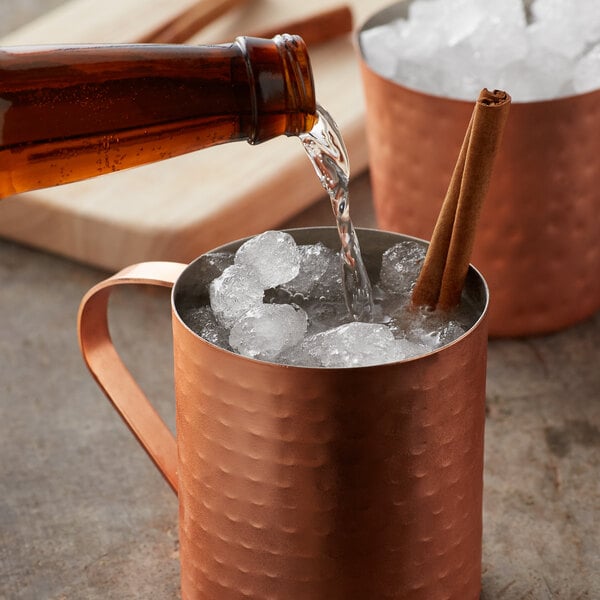
Ginger beer and ginger ale are two ginger-based beverages often mistaken for one another. While both share a common ingredient and possess a ginger flavor, there are key differences between the two. Ginger beer is spicier and has a more pronounced ginger flavor compared to ginger ale. This is because ginger beer is brewed with real ginger root, whereas ginger ale is usually made with ginger flavoring or extract. Because it contains real ginger root, it has a cloudier appearance than ginger ale. Ginger beer's strong and complex taste makes it a preferred choice when seeking a more pronounced ginger kick in both non-alcoholic and alcoholic drinks.
Ginger ale has a milder ginger taste and is typically sweeter and less spicy than ginger beer. It is also more carbonated and has a smoother mouthfeel. Ginger ale is commonly consumed on its own or as a mixer in lighter cocktails, such as the Pimm’s Cup or a shandy.
Ginger Beer Cocktails
Ginger beer's bold and zesty flavor makes it a fantastic ingredient for cocktails. Its spiciness is a staple in some cocktail recipes and adds a delightful twist to others. Here are a few ginger beer cocktail ideas to explore:
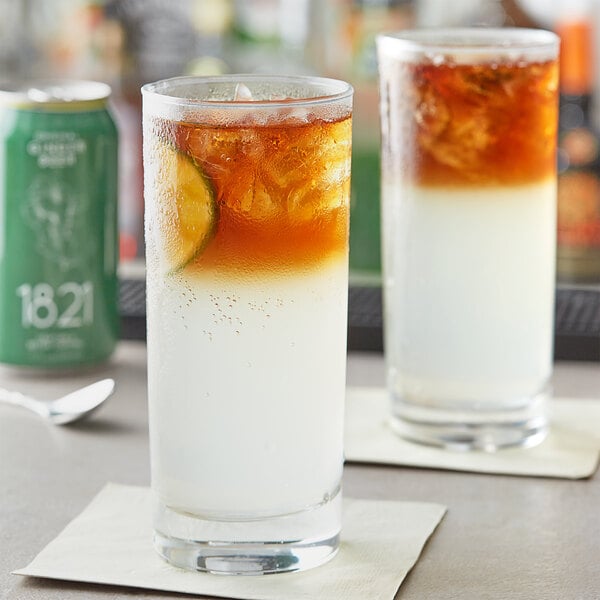
- Moscow Mule: The classic Moscow Mule is a popular choice that combines ginger beer, vodka, and lime juice. Fill a copper mug with ice, add 2 oz. of vodka, squeeze in the juice of half a lime, and top it off with ginger beer. Stir gently and garnish with a lime wheel or mint sprig.
- Dark 'n' Stormy: This simple yet captivating cocktail features dark rum and ginger beer. Fill a highball glass with ice, pour in 2 oz. of dark rum, and top it off with ginger beer. Give it a quick stir and garnish with a lime wedge.
- Ginger Beer Margarita: Put a twist on the classic margarita by incorporating ginger beer. In a shaker filled with ice, combine 2 oz. of tequila, 1 oz. of fresh lime juice, and 1/2 oz. of triple sec. Shake well, strain into a salt-rimmed glass filled with ice, and top it off with ginger beer. Garnish with a lime wheel or a slice of fresh ginger.
- Gin Buck: This refreshing gin-based cocktail is easy to make. Fill a Collins glass with ice, add 2 oz. of gin, squeeze in the juice of half a lemon, and top it off with ginger beer. Stir gently and garnish with a lemon twist.
- Ginger Beer Mojito: Give the classic mojito a ginger-infused twist. Muddle a handful of fresh mint leaves and a lime wedge in a glass. Add 2 oz. of white rum, a splash of simple syrup, and fill the glass with ice. Top it off with ginger beer, give it a gentle stir, and garnish with a mint sprig.
Experiment with the ratios and adjust the ingredients based on your personal taste preferences to create refreshing and flavorful concoctions. Garnish options can also be customized with herbs, fruit slices, or even a dash of bitters to add depth to the flavors.
Overall, ginger beer is a flavorful, zesty beverage with a range of applications. The spicy and refreshing flavor of ginger beer pairs well with a variety of spirits, making it a versatile mixer for bartenders. In addition to its use in cocktails, ginger beer is also a popular choice for non-alcoholic drinks. Its unique flavor profile makes it a great alternative to traditional sodas, and its natural ingredients appeal to health-conscious consumers.
